Designing Good Units - Beggar's Canyon
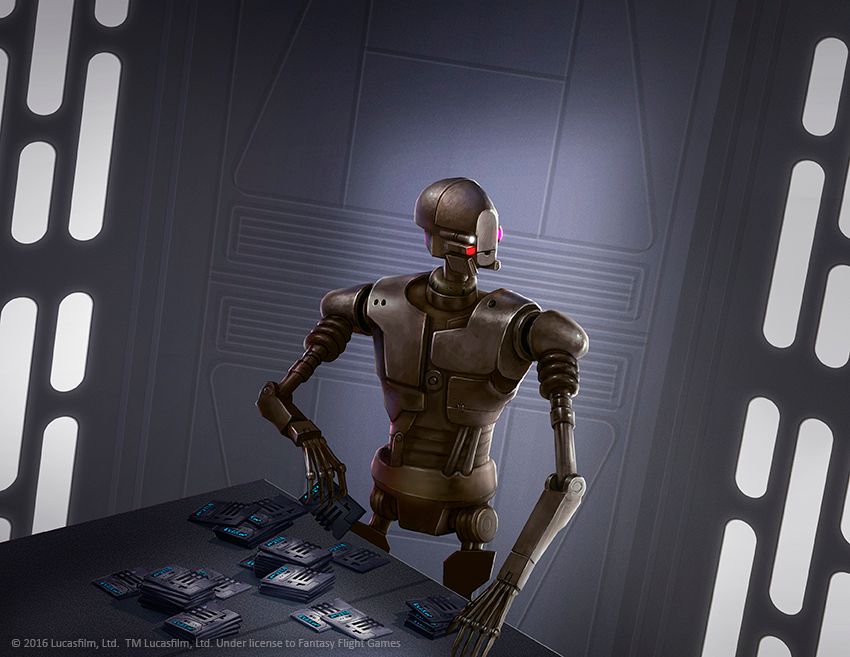
Maybe you're an aspiring game designer. Maybe you just enjoy the hobby. Maybe you've got time to kill. Regardless, you've decided to take up making custom units. How do you do this, might you ask? Well you don't need a crash course on photoshop to be able to make your own guys, Tabletop Admiral has a custom unit maker! The way to unlock this is by supporting them on Patreon, which I happily did because I love their list builder and the custom unit maker is crisp and clean, producing units that are very similar to actual units!
Today we'll be taking a look at what makes a unit good, what makes a unit balanced, and how to design a unit within the parameters that the game has provided (or how to go way beyond those parameters!).
Good Units
Some of the most well designed units in the game are ones that are not only balanced but are thematic. A balanced unit may be more important for tournament play, but at the end of the day you want the unit to be cool too. Some of the most well designed units in terms of theme are ones like Captain Rex with his affinity to leading clone troopers, or Maul and his rage fueled strength. Beyond named characters it can be tough to get good theme, but units like Death Troopers with their Disciplined 1 and Fleet Troopers with their Ready 1 portray how they act within films and TV despite limited screen time.
In order to design units that make sense, try keeping it simple rather than creating a "Keyword Soup". The units with tons of keywords can be special ones, like vehicles and characters. You can always add some mechanics in the form of upgrade cards!
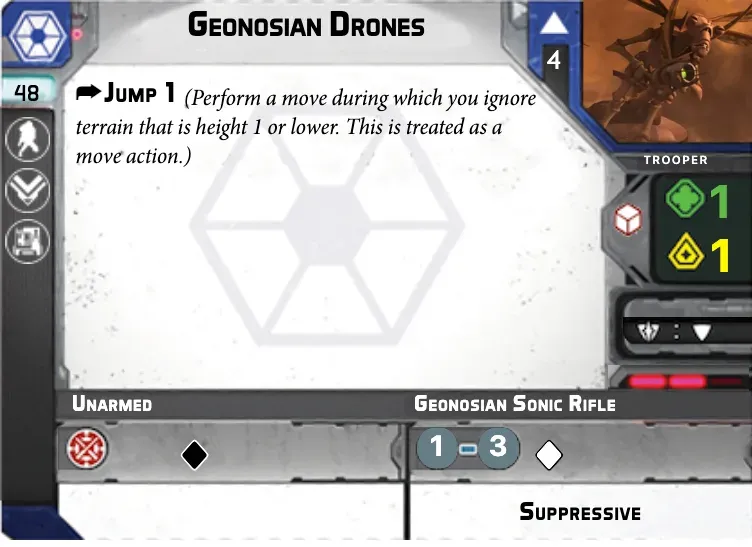
Here's a unit that I created as an alternative to the Droid Corps we've seen for CIS. I think these guys are, arguably, a little weak for their point cost, but that is negated by the faction they are in having little access to units without AI, so they have to pay a premium for that. Jump 1 is a marginal keyword for the most part, but fits the thematic element. It also allows them to play a "support" role where they can suppress units from high terrain, focusing less on damage.
You'll notice that I chose 48 for their cost, which is something that took me a bit to settle on. In most other factions I would think this is a bit high, but here it seems about right. Arguments could be made in both directions, but the nice thing is that points changes are regularized now.
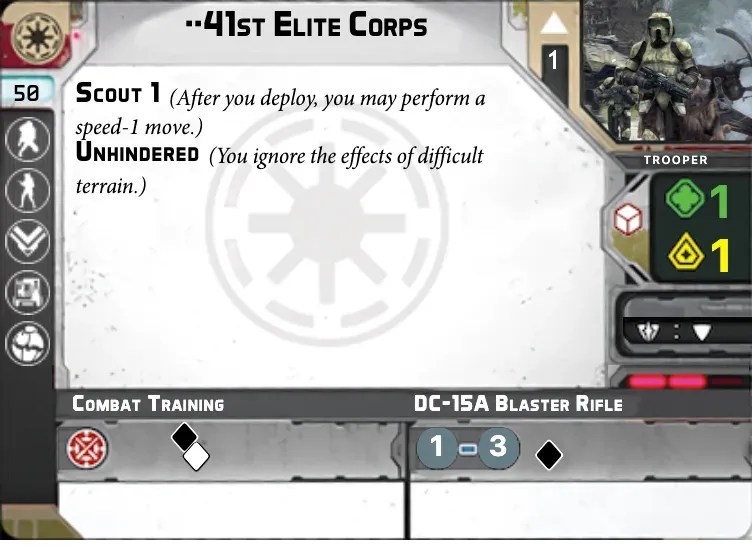
In the same vein I decided to create an alternative to the Clone Corps we've seen. This one borrows something from X-Wing 2.0 that I love, and that is the multiple unique symbol (The two dots in front of the name ··). I think that this allows for you to always see traditional clones on the table, but it also allows for strong and unique units to be added that might be limited in numbers, but not limited to a single unit. To a rebel player this may seem overcosted, but in a faction where corps are 52+ saving a few points is nice. The argument could again be made that they are too expensive, but I think that 50 is a good place for them in the faction.
Now, I would hardly say that these units are perfect. They could surely be tinkered with and playtested, but that is what the kitchen table is for! When designing a new unit it can be fun to playtest with them. There is no way better to know if a unit is good or bad than putting it on the table.
Balanced Units
Some great examples of balanced units are the generic Stormtroopers and Rebel Troopers. They are staples and do certain things well and others poorly. Stormtroopers are more naturally defensive (marginally) than rebel troopers because of their armor, but roll worse offensive dice that require aims to make better. Rebel Troopers are squishier, but have more accurate blaster rifles and the ability to duck and weave through oncoming fire. They are costed appropriately and are not flashy, but with heavy weapon and personnel options they can be outfitted to be more unique and interesting units.
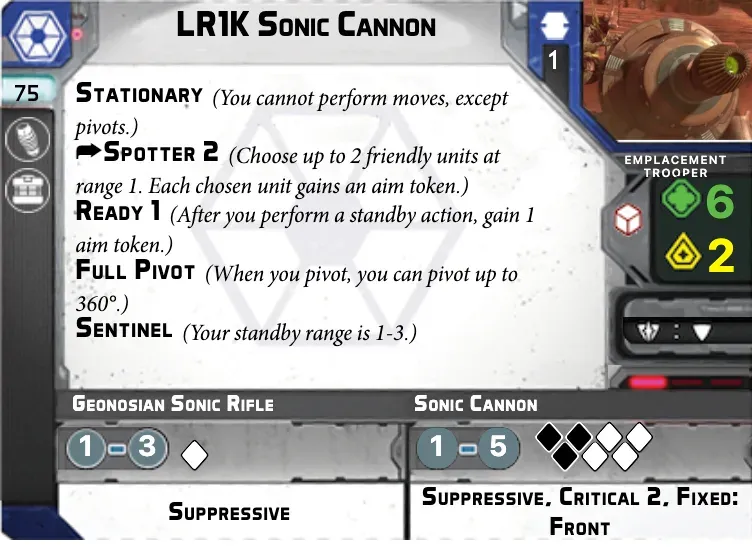
I designed this unit modeling after the FD cannon as a way to potentially make Stationary not as hindering. This leans into the Geonosian theme of the sonic cannons suppressing their foes and plays more of a support role (the same as the Geonosian drones) with Spotter 2. Ready 1 and Spotter 2 both are welcome additions to a unit that can be limited by lack of movement, so hopefully your turns are never useless. The points reflect the addition of keywords and dice, and more generators could be added to make this a more varied and interesting weapon. Overall, this feels "fair" and like something that the separatists may think about taking, but never auto-include.
Designing Within the Parameters
This is something that is looser because making new keywords is cool. The problem comes when you've made 5 new keywords for your corps unit of flying astromech droids. Tons of fun! But functionally a lot to keep up with. More power to you if this is how you like to design, but oftentimes what devs do is trickle in new keywords over time and then combine them in later units, which lets players get accustomed to how the keywords work before having to apply all of them at the same time.
Another thing is to be careful not to make a keyword way too confusing. The "Mastery" keywords found on Clone Wars era force users are perfect examples of where the line is on this. They are strong effects that feel flavorful, but it is important to note that they don't push the game too far with one keyword. Soresu Mastery does this well by being an upgraded Deflect to use with Guardian. The same applies to Djem So. Ataru Mastery is confusing the first time you read it, but after playing a game you realize the strength and the fun of double attacks and extra tokens.
I've created a set of characters to showcase new keywords and the combination of old keywords. They have not been tested and may be unbalanced one way or the other, but they hopefully serve the purpose of how keywords can stack without becoming too confusing.
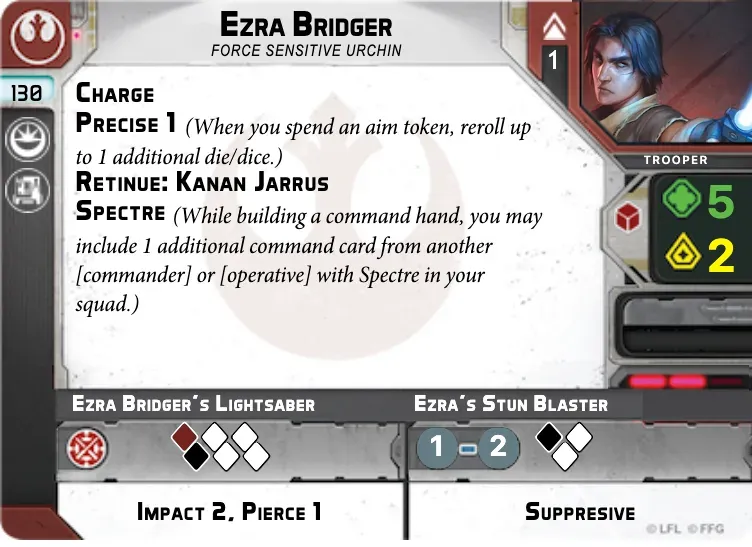
Ezra Bridger introduces us to the Spectre keyword which allows us to have additional cards in hand (sort of like contingencies, but specifically for Spectre units). This can be strong in the options it provides, but it adds up quick as Spectre units aren't cheap. This Ezra is shown to be brash, headstrong, and untrained. He only becomes more disciplined when near his master, Kanan. His weapons are better because of Precise 1, but his upgrade slots are limited. At 130 points he feels stronger, but more one sided than Sabine, which is about where I was looking to place him. He could be argued to be more points, but with no defensive capabilities I think it balances out.
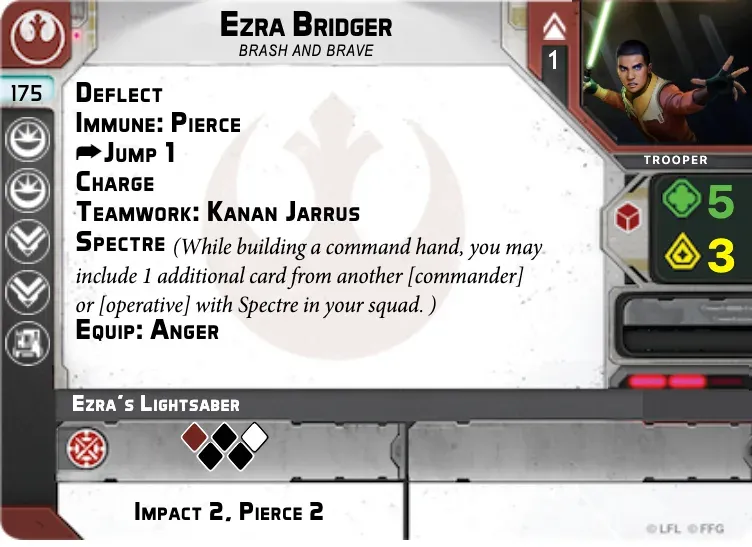
Ezra's trained state is more formidable and comparable to commander Luke. Teamwork: Kanan Jarrus shows that he still works well with Kanan, but doesn't need him. Equip: Anger is like Tempted Jr., which is a fun way to show that Ezra has struggled with wanting to use the dark side, but doesn't ever truly give in. He now also has the traditional Jedi suite of Immune: Pierce, Deflect, and Jump 1, all of which play into the fluff of him receiving his training. He loses his ranged weapon but gains a stronger melee weapon, which fits the flavor of the show.
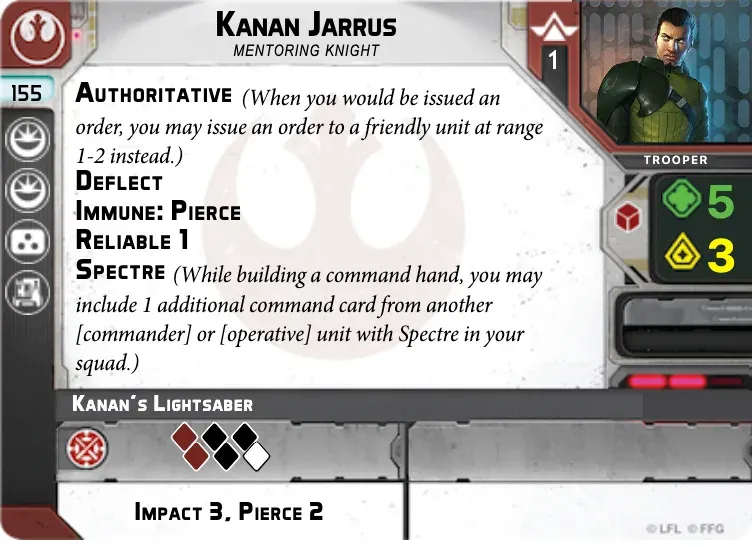
Kanan has always been a better Jedi than his padawan, and this shows it. Authoritative is fluff that Ezra needs to be directed orders, and Reliable 1 is fluff that he can always be counted on. Otherwise, it is a normal Jedi suite, and some of his unique moments will be portrayed through command cards rather than on the unit card.
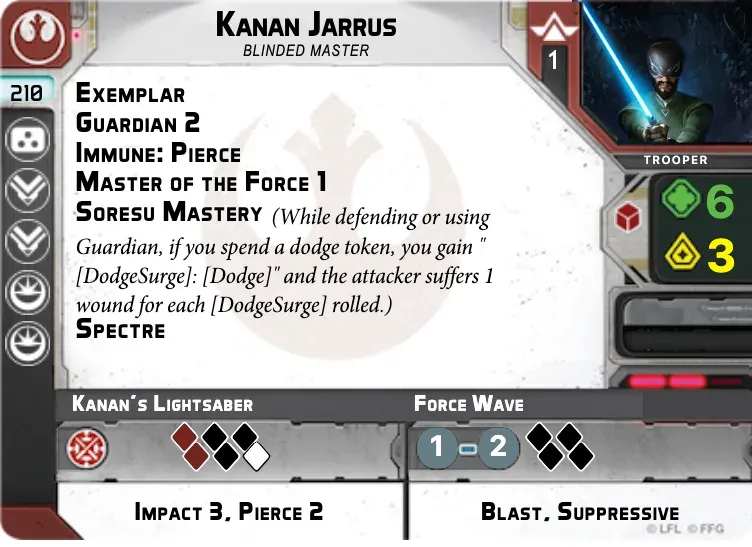
Though blind, Kanan is not any weaker. He learns to use the Force to feel for his surroundings, which lets him play a more defensive game. Soresu Mastery and Guardian play into this, along with Master of the Force letting him gain a dodge from something like Force Reflexes every turn. Exemplar shows now that he leads by example rather than barking orders, and his help is always available. He also has Force Wave as a ranged attack now because of fluff and to justify a higher point cost. This version of Kanan is a strong commander for your rebel army that fits the wizened master that he is.
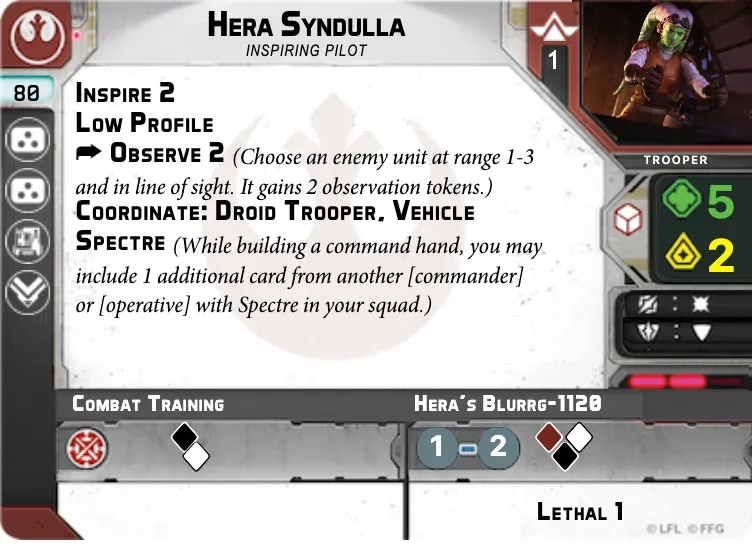
Hera is a cheap commander for your army that is meant to play well with vehicles. Her command cards would reflect that, but Inspire 2 shows that she also leads troopers well. Similar to Leia in many ways, Hera builds her strengths off of more open ended support options, and Spectre is a way of showing that she works well as a team.
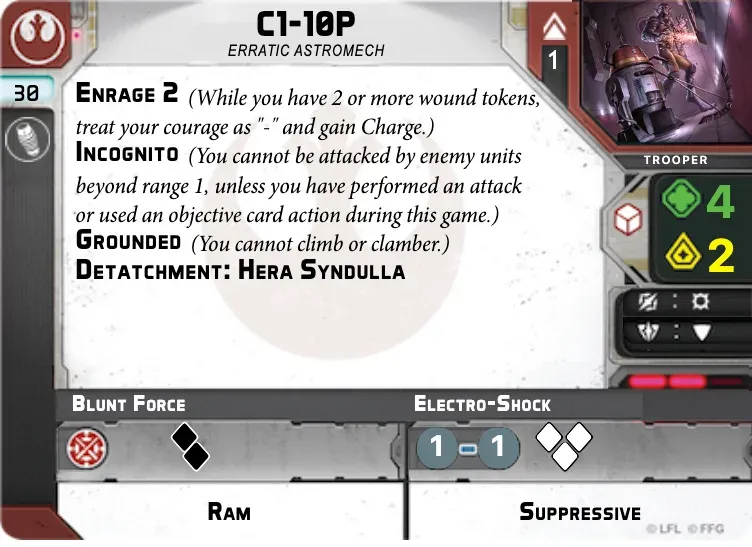
Chopper! A very similar unit to R2-D2, he loses his secret mission to instead become a stronger melee machine! This is more fluff than anything else, but Chopper could easily fit into a list as a cheap activation and objective grabber. One could argue that Chopper still thematically has a lot of secret missions, and I agree, but in order to not make R2-D2 2 I chose to omit the keyword.
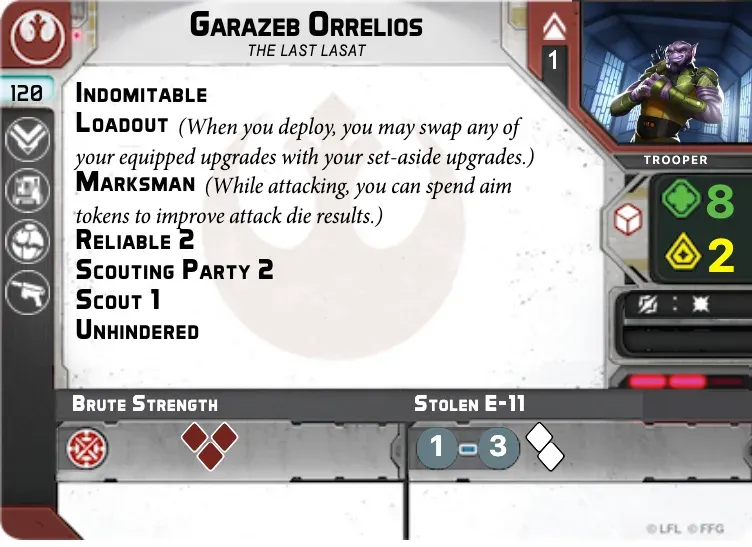

Whoa that's a lot of keywords! With 7 keywords, this is arguably my first "Keyword Soup" unit. There is a lot to keep track of, but it is important to note that Loadout, Scouting Party, and Scout all take place at the start of the game and never again, which leaves you with 2 every turn keywords (Indomitable and Reliable) and then 2 situational keywords (Unhindered and Marksman). Zeb also has his Bo-Rifle, but it is largely the same as Kallus' mechanically, just having an additional red die. The ranged side is the same as this one, just minus the extra melee text and being a range 1-3 blaster.
All of these units are exciting, flashy, and fun! Maybe I'll make command cards for them one of these days, but for the most part these units are balanced around their unit cards rather than their command cards. On the other hand...
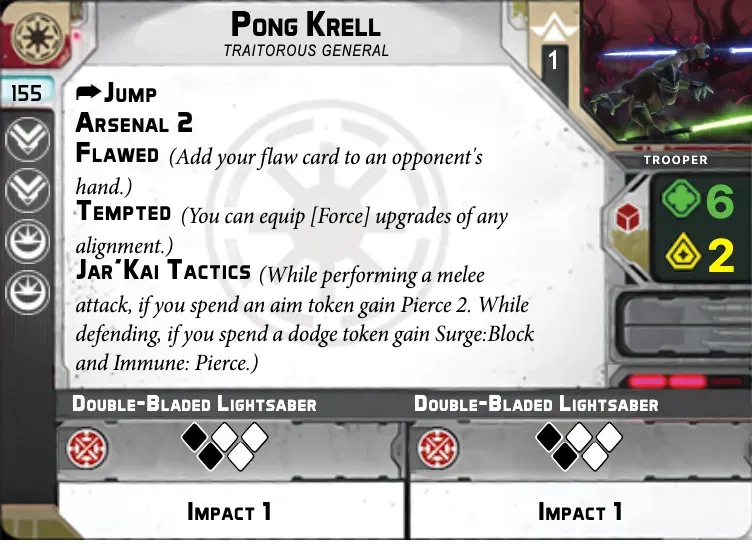
Pong Krell! The first unit I made, he was an exercise in making a unit that does self damage in a game where every hit point can matter. None of these abilities deal damage to him, but his command cards are supposed to have a negative effect alongside the postitive. (Sadly, Tabletop Admiral does not have an ability to resize the text box on command cards, making some of these cards impossible to create. Instead, I have listed their effects below.)
- "Foiled Plan" - Flaw Card: At the start of the Command Phase, if there is a damaged enemy Pong Krell at range 1-2 of a friendly unit, you may play this card. Each friendly unit at range 1-2 of Pong Krell may gain either 1 aim, 1 dodge, or 2 surge tokens.
- "Traitorous Escape" - One Pip - Orders to Pong Krell - If there is an enemy unit at range 1-2 of Pong Krell, he gains -> Jump 2, Disengage, and treats his maximum speed as 1.
- "A New Power Rising" - Three Pip - Orders to Pong Krell - After revealing this command card you may treat it as though it has one pip and Pong Krell gains 1 suppression, Barrage, and 1 aim token. Otherwise, Pong Krell gains Relentless and 1 dodge token.
- "Carnage of Krell" - Three Pip - Orders to Pong Krell and 2 Troopers - When a friendly unit with a faceup order token activates it suffers 1 wound and recovers. At the end of its activation it may suffer 1 wound to gain 1 standby token.
Understandably these cards don't have to be taken, but they have their strengths. I enjoy the thought of these being positive and negative, much like Anakin's, but with unavoidable negative effects. I don't think these are balanced, nor do I think the unit card is balanced, but I do think that these are fun and partially thematic options to play with on a homebrew table.
Conclusion
Wow! What a jumbled mess of my own making that was! I hope you enjoyed reading this, I would really love to see your custom units and I constantly look through the custom units page on Tabletop Admiral to see what people are making. I am no expert in game design, but I have played games long enough to know that there are good and bad things in design.
Comment below your thoughts on custom card and game design, and I'll get back to you! I look forward to hearing what you have to say, and stay tuned for more Legion, Armada, and X-Wing content here on Dice and Cardboard!
